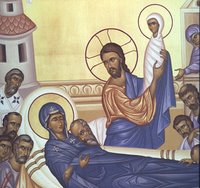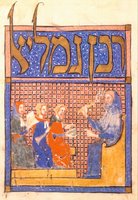
The following is a condensed version of a sermon by St John of Damascus on the Dormition of the Blessed Virgin Mary. It was preached this morning at the Dormition Mass at Zion Evangelical-Lutheran Church of Detroit.
No one who has ever lived, and who lives now, is able to praise worthily the holy death of Mother of God because she is greater than all praise. Nevertheless, since it is pleasing and acceptable to God that we should, as best we can, honor her with all our heart and love and zeal, and since what is pleasing to her Son is pleasing to His mother, let me make a feeble attempt to praise the Mother of our God and Lord, Jesus Christ. To do this, I invoke the Word made flesh in the womb of the blessed Mary. May He assist me, for He gives speech to every mouth which is opened for Him, and He is her sole pleasure and adornment.
Today the holy Virgin of Virgins is presented in the heavenly temple. Virginity in her was so strong as to be a consuming fire. It is forfeited in every case by child-birth. But she is ever virgin: before the event, in the birth itself, and afterwards.
Today the sacred and living ark of the living God, who conceived her Creator Himself, takes up her abode in the temple of God, not made by hands. David, her forefather, rejoices. Angels and Archangels are in jubilation, Powers exult, Principalities and Dominations, Virtues and Thrones are in gladness: Cherubim and Seraphim magnify God. Not the least of their Praise is it to refer praise to the Mother of glory.
Today the holy dove, the pure and guileless soul, sanctified by the Holy Spirit, putting off the ark of her body, the life-giving receptacle of Our Lord, found rest to the soles of her feet, taking her flight to the spiritual world, and dwelling securely in the sinless country above.
Today the Eden of the New Adam welcomes its true paradise, in whom our sentence has been repealed. For in her the Tree of Life was planted, and our nakedness is covered. For we are no longer naked and uncovered, and unable to bear the splendor of the divine likeness. Strengthened with the abundant grace of the Spirit, we shall no longer lament our nakedness saying, “I have Put off my garment, how shall I put it on?” For in this Paradise, this woman, the serpent found no entrance. He could not deceive her with the promise to be like God. For the only begotten Son of God, God himself, of the same substance as the Father, took His human nature of the pure Virgin. Because of this—because of His coming down into Mary’s womb, and her willingness to receive Him—we, who are men, can become God; we, who are mortal, are made immortal; and we, who are corruptible, can now in the Spirit put aside corruption and be clothed in the garment of divinity.
Today the spotless Virgin, untouched by earthly affections, and all heavenly in her thoughts, was not dissolved in earth, but truly entered heaven to dwell in the heavenly tabernacles. Who would be wrong to call her heaven, unless indeed he truly said that she is greater than heaven in surpassing dignity? With her womb, the Lord and Creator of heaven, created Himself, without the aid of a man. He made her a rich treasure-house of His Godhead. He resided in her entirely without passion. Now how could she, who brought life to all, be under the dominion of death? Yet she obeys the law of her own Son, and inherits this chastisement as a daughter of the first Adam, since her Son, who is the life, did not refuse it. As the Mother of the living God, she goes through death to Him.
O people of Christ, let us then acclaim her today in sacred song. Let us acknowledge our own good fortune and proclaim it. Let us delight in her purity of soul and body, for next to God, she surpasses all in purity. It is natural for similar things to glory in each other. Let us show our love for her by compassion and kindness towards the poor. For if mercy is the best worship of God, who will refuse to show His Mother devotion in the same way? She opened to us the unspeakable abyss of God’s love for us. Through her the old enmity against the Creator is destroyed. Through her our reconciliation with Him is strengthened, peace and grace are given to us, men are the companions of angels, and we, who were in dishonor, are made the children of God. From her we have plucked the fruit of 1ife. From her we have received the seed of immortality. She is the channel of all our goods. In her God was man and man was God. What is more marvelous or more blessed?
Therefore, let our souls rejoice in this Ark of God. Let us dance in spirit with David; today the Ark of God is at rest. With Gabriel, the great archangel, let us exclaim, “Hail, full of grace, the Lord is with thee. Hail, inexhaustible ocean of grace. Hail, sole refuge in grief. Hail, cure of hearts. Hail, through whom death is expelled and life is installed.”
You will find the full sermon
here, which also served as the original source. An eye was also on another translation of the same sermon found in volume 4 of The Sunday Sermons of the Great Fathers.
 Humility and faith go together. To trust is to set aside your pride—that you know best, that you have all the answers, and that you can work things out on your own. And to be humble is to believe that you are no better than others, and that you need and depend on them.
Humility and faith go together. To trust is to set aside your pride—that you know best, that you have all the answers, and that you can work things out on your own. And to be humble is to believe that you are no better than others, and that you need and depend on them. 





